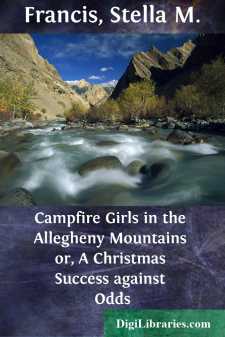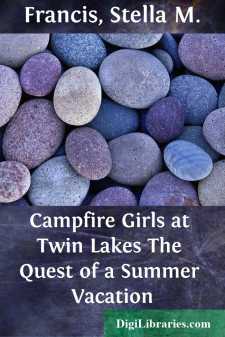Categories
- Antiques & Collectibles 13
- Architecture 36
- Art 48
- Bibles 22
- Biography & Autobiography 813
- Body, Mind & Spirit 142
- Business & Economics 28
- Children's Books 16
- Children's Fiction 13
- Computers 4
- Cooking 94
- Crafts & Hobbies 4
- Drama 346
- Education 46
- Family & Relationships 57
- Fiction 11829
- Games 19
- Gardening 17
- Health & Fitness 34
- History 1377
- House & Home 1
- Humor 147
- Juvenile Fiction 1873
- Juvenile Nonfiction 202
- Language Arts & Disciplines 88
- Law 16
- Literary Collections 686
- Literary Criticism 179
- Mathematics 13
- Medical 41
- Music 40
- Nature 179
- Non-Classifiable 1768
- Performing Arts 7
- Periodicals 1453
- Philosophy 64
- Photography 2
- Poetry 896
- Political Science 203
- Psychology 42
- Reference 154
- Religion 513
- Science 126
- Self-Help 84
- Social Science 81
- Sports & Recreation 34
- Study Aids 3
- Technology & Engineering 59
- Transportation 23
- Travel 463
- True Crime 29
Campfire Girls in the Allegheny Mountains or, A Christmas Success against Odds
Categories:
Description:
Excerpt
CHAPTER I.
Wo-he-lo for aye,
Wo-he-lo, Wo-he-lo, Wo-he-lo for aye!
Wo-he-lo for work,
Wo-he-lo for health,
Wo-he-lo, Wo-he-lo, Wo-he-lo for love."
Two hundred and thirty-nine girl voices chanted the Wo-he-lo Cheer with weird impressiveness. The scene alone would have been impressive enough, but Camp Fire Girls are not satisfied with that kind of "enough." Once their imagination is stimulated with the almost limitless possibilities of the craft, they are not easily pleased with anything but a finished product.
The occasion was the last Grand Council Fire of Hiawatha Institute for Camp Fire Girls located in the Allegheny city of Westmoreland. The classroom work had been rushed a day ahead, examinations were made almost perfunctory, and for them also the clock had been turned twenty-four hours forward. The curriculum was finished, and the day just closed had been devoted to preparation for a Grand Council wind-up for the fifteen Fires of the Institute, which would "break ranks" on the following day and scatter in all directions for home and the Christmas holidays.
And there was literal truth in this "break ranks" method of dismissing school at the Institute. Since the United States entered the European war on the side of the anti-frightfulness allies, Hiawatha had become something of a military school. The girls actually drilled with guns, and they would shoot those guns with all the grim fatality of so many boys. Not that they expected to go to war and descend into the trenches and fire hail-storms of steel-coated death-messengers at the enemy. Oh, no. They might, but they were sensible enough not to let their imagination carry them so far. But preparedness was in the air, and the girls voted to a—a—girl (I almost said man, for they were as brave as men in many respects) to take up military drill and tactics two hours a week as a part of their curriculum.
Madame Cleaver, head of the Institute, did not start the military movement rashly. She was carefully diplomatic in the conduct of her school, for she must satisfy the critical tastes and ideas of a high-class parentage clientele. But she also kept her fingers on the pulse of affairs and knew pretty well how to strike a popular vein. Hence the membership of her classes was always on the increase. Indeed, at the beginning of this school year, she had to turn away something like forty applicants, for want of room and accommodations.
Hiawatha Institute was founded as a Camp Fire Girls' school, and when Uncle Sam became involved in the European war, the national need for nurses appealed strongly to Camp Fire Girls everywhere. What could they do? The very nature of the training of the girls from Wood Gatherer to Torch Bearer made the question, so far as they were concerned, a self-answering one. They had all the broad commonsense rudiments of nursing. With some advanced science on top of this, they would be experts.
But military authorities said that the nurses ought to have some military drill. War nurses must be organized, and there was no better method of effecting this orderly requisite than by military training.
One well-known captain of infantry informed Madame Cleaver that war nurses could not reach the highest grade of efficiency unless they were able to march in columns from one camp to another and be distributed in squads at the points needed.
With all this information at her tongue's end, the madame put the matter to her uniformed girls in the assembly hall. Rumor of what was coming had reached them in advance, so that it did not fall as a surprise. The vote was unanimous in favor of the plan. The needed nursing expert was already a member of the faculty. The classes were formed a few days later.
These were the girls that gathered around a big out-door campfire—it was really a bonfire—in the snow of mid-winter on the evening of the opening of this story....



